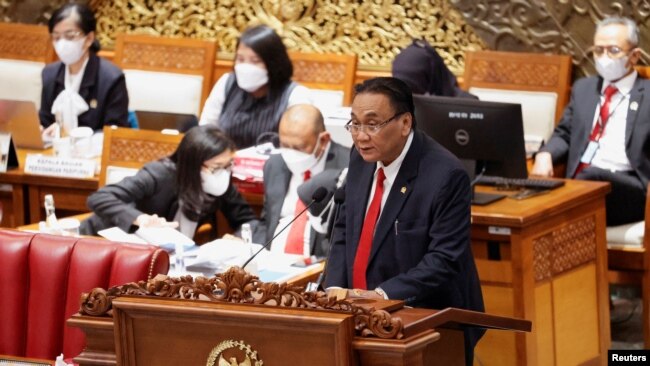タイトルを見て、驚き!!
一体、どんな罰則が適応されるのでしょうか。
VOAで英語を学びましょう!!
- 改正された法律では、結婚以外の性行為は1年間の懲役に処せられるという。また、同棲している未婚のカップルは6ヶ月の懲役となります。
- この法律では、妊娠を終わらせるための医療処置である中絶は以前から禁止されています。しかし、今回の改正では、2004年の医療行為法ですでに規定されている例外が追加されました、胎児が12週未満であることを条件に、生命を脅かす病状やレイプをされた女性についてです。
- また、マルクス・レーニン主義組織とつながりがある場合、市民は10年の禁固刑、共産主義を広めた場合は4年の禁固刑に処せられる可能性があります。
- この法律では、一部の団体が死刑の廃止を求めたにもかかわらず、依然としてdeath penalty死刑が認められています。
- 現職の大統領、副大統領、政府や国家のイデオロギーを侮辱することを禁止しています。現職の大統領を侮辱した場合、最高で3年の禁固刑となります。
- この改正は、既存のblasphemy冒涜的な法律を拡大するものです。この法律では、インドネシアで認められている6つの宗教:イスラム教、プロテスタント、カトリック、ヒンズー教、仏教、儒教から離れた場合、5年の懲役刑が科されることになっています。
市民権団体は、新法は過度に広範で不明確だと批判しています。通常の活動を犯罪化し、表現の自由やプライバシーの権利を脅かすと彼らは言います。
インドネシアのLGBTQの権利を支援する団体は、新法のある変更点を喜んでいます。それは、同性愛者同士のセックスが違法行為のリストに含まれていないことです。
インドネシアのジョコ・ウィドド大統領は、新法に署名する見込みです。彼が署名しなくても、30日後に発効します。
しかし、インドネシアのエドワード・ヒアリイ法律・人権担当副大臣は、この法律は最長で3年間施行されないと述べます。施行策は”練り上げなければならない”ので、1年では無理だと指摘しています。
インドネシアの指導者たちは、2019年に国の刑法を更新しようとしました。しかし、ウィドドは全国的な抗議行動を受け、議員に投票を延期するよう求めました。抗議者たちは、法律が差別的であり、変更を行うためのプロセスが不明確であると述べています。
政府は、火曜日の新法への投票を、インドネシアのオランダからの独立における”歴史的な一歩”と呼んでいます。同国は1945年に独立しましたが、オランダの行政官が同国の法律の多くを作成しました。
アンドレアス・ハルソノ氏は、ヒューマン・ライツ・ウォッチの上級研究員です。彼は、インドネシアの新しい法律の変更は危険であると述べています。彼は、「これらの法律は、警察に賄賂をextort強要させ、役人にpolitical foes政敵を投獄させます」と言っています。
ハルソノ氏は、バリやジャカルタのような場所は、新しい法律のために外国人観光客を失う危険性もあると付け加えます。
Indonesia to Ban Sex Outside of Marriage
Indonesia’s parliament on Tuesday voted for new laws to ban sex outside of marriage. The new measure also bans people from insulting the president and government.
Once in force, the bans will affect foreign visitors as well as citizens. But a government official said the new laws will not be in place for several years.
- The amended law says sex outside marriage is punishable by a year in jail. And unmarried couples living together will face six months in prison.
- The law keeps a previous ban on abortion, a medical procedure to end a pregnancy. But the changes add exceptions already provided in a 2004 Medical Practice Law, for women with life-threatening medical conditions and rape, provided that the fetus is less than 12 weeks old.
- Citizens could also face 10 years in prison for having links to Marxist-Leninist organizations and 4 years for spreading communism.
- The law still permits the death penalty, even though some groups pushed for its removal.
- It restores a ban on insulting a sitting president, vice president, as well as government or national ideology. Insults to a sitting president could lead up to three years in jail.
- The change expands an existing blasphemy law. It gives a five-year prison term for those who move away from Indonesia’s six approved religions: Islam, Protestantism, Catholicism, Hinduism, Buddhism and Confucianism.
Civil rights organizations criticized the new laws as overly broad and unclear. They said they will criminalize normal activities and threaten freedom of expression and privacy rights.
Groups that support the rights of LGBTQ people in Indonesia were pleased with one change in the new law: sex between gay people is not included in the list of illegal acts.
Indonesia’s President Joko Widodo is expected to sign the new laws. Even if he does not sign it, they will take effect after 30 days.
But Deputy Minister of Law and Human Rights for Indonesia Edward Hiariej said the law will not be enforced for up to three years. He noted that enforcement measures “must be worked out” and could not be done in one year.
Indonesia’s leaders tried to update the nation’s criminal law in 2019. But Widodo asked lawmakers to delay the vote after nationwide protests. The protesters said the laws were discriminatory and the process for making the changes was unclear.
The government called Tuesday’s vote for the new law “a historic step” in Indonesia’s independence from the Netherlands. The country has been independent since 1945 but Dutch administrators wrote many of the nation’s laws.
Andreas Harsono is a senior researcher at Human Rights Watch. He said changes to the new Indonesian laws are dangerous. He said, “These laws let police extort bribes, let officials jail political foes.”
Harsono added that places like Bali and Jakarta will also risk losing foreign visitors because of the new laws.
Words in This Story
penalty –n. a punishment
ideology –n. the set of beliefs of a group
blasphemy –n. something said or done that is disrespectful toward God
LGBTQ –n. used to mean Lesbian, Gay, Bisexual, Transgender and Queer
extort –v. to get something (such as money) through a use of force or threats
bribe –n. to ask someone to do an illegal or unethical act in exchange for money or a favir
foe –n. an opponent or rival
